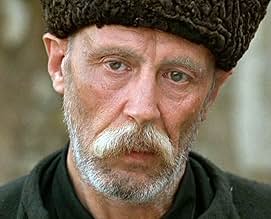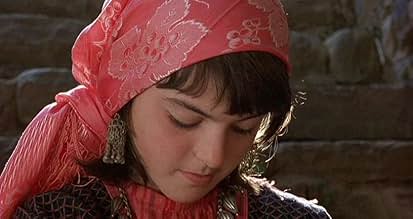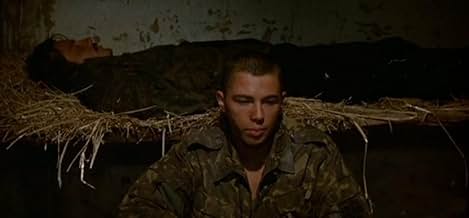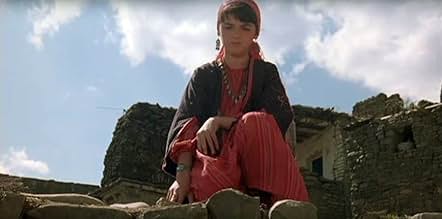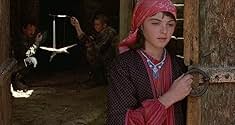IMDb-BEWERTUNG
7,5/10
4876
IHRE BEWERTUNG
Füge eine Handlung in deiner Sprache hinzuTwo Russian soldiers, one battle-seasoned and the other barely into his boots and uniform, are taken prisoner by an anxious Islamic father from a remote village hoping to trade them for his ... Alles lesenTwo Russian soldiers, one battle-seasoned and the other barely into his boots and uniform, are taken prisoner by an anxious Islamic father from a remote village hoping to trade them for his captured son.Two Russian soldiers, one battle-seasoned and the other barely into his boots and uniform, are taken prisoner by an anxious Islamic father from a remote village hoping to trade them for his captured son.
- Für 1 Oscar nominiert
- 14 Gewinne & 7 Nominierungen insgesamt
Empfohlene Bewertungen
One might assume that the title refers only to the two Russian soldiers taken hostage by villagers in the Caucasus. But the Russian army has the village surrounded, so the townspeople are also prisoners. Moreover, each side is a prisoner of their own hate: the Russians can't see the villagers as humans and the villagers can't see the Russians as humans, thereby continuing the cycle of hate. Even the village elder is a prisoner of tradition: he uses a ceremonial knife for something in which he could have used a gun.
All in all, "Kavkazskiy plennik" (called "Prisoner of the Mountains" in English) is a very well done movie. Oleg Menshikov and Sergei Bodrov Jr. do very well with their roles, and the situation in Chechnya makes the movie all the more relevant.
All in all, "Kavkazskiy plennik" (called "Prisoner of the Mountains" in English) is a very well done movie. Oleg Menshikov and Sergei Bodrov Jr. do very well with their roles, and the situation in Chechnya makes the movie all the more relevant.
I liked this movie very much. It showed the human side of war. It is a compelling view of life during wartime, as seen through the eyes of a handful of individuals, each with his own perspective and agenda. The story is a warm, sometimes depressing, but ultimately hopeful look at human nature at it's best, and worst.
Prisoner of the Mountains is an excellent movie. Vanya a young recruit , and Sasha a veteran soldier in the Russian army are captured after an ambush by the Chechens. The Chechen leader keeps them to trade for his son who is captured by the Russians. Then a friendship develops between the Chechens, and the two Russians. I study Russian in college, and even though the subtitles aren't very accurate at times it still helps. The whole plot is just amazing. It shows the human side of soldiers. I definitly recommend this movie to anyone who hasn't seen it.
10mozibuzi
In this film, I can find almost everything what I like in a movie. It presents the life of a small community, their thoughts, their feelings and their habits. It has a nice atmosphere, beautiful sights, good actors, and a strong story. What else do you want? Another reason to love Russian movies.
Prisoner of the Mountains provides an inside look into the Russia/Chechnya conflict through the eyes of two captured Russian soldiers, Vania and Sacha. The unlikely duo forms a friendship out of their will to escape their imprisonment. Despite the serious basis for the story (the continuing war between the two countries), the film is very multifaceted in that it contains comedy, love, and suspense. In this respect, I greatly disagree with another user who described the film as `bleak, tedious, and uneventful.' The main reason this film succeeds is that it does not only focus on the war and battles between the two sides, but rather develops the underside of the conflict-the characters on both sides.
This user likens this film to watching polar bears sleeping because violence only makes up ten per cent of the plot. I have seen movies that are as boring as this analogy. Prisoner of the Mountains does not qualify as this type of film. Bodrov incorporates many different types of scenes in the plot action that evoke a variety of emotions from the audience. There are serious scenes, such as when Sacha and Vania are captured, which elicit fear and apprehension in the viewer. In contrast, there are also more humorous scenes, as in when Vania continues to meddle with the gun he and Sacha stole, after Sacha warns him to be careful, and the gun fires, causing them to lose their only bullet. In this respect, Bodrov makes his film very well-rounded by incorporating various types of scenes that play to different emotions. While the central plot is serious in its portrayal of the war, Bodrov includes less intense scenes in order make the film more interesting and develop the personalities of the characters. The scenes in which Vania and Sacha are shown `getting drunk, whittling, chatting with passers-by, and making friends with their captors' serve to help the audience understand the backgrounds of all of the characters, as well as show character transformation. Through discussions between the two soldiers, the audience discovers that Sacha's at first exterior most likely results from the fact that he is an orphan. In time, we see how Sacha grows to respect Vania, despite his naive nature, and becomes a father-figure to the younger soldier, ultimately sacrificing his life for him. Moreover, we learn how Dina grows fond of Vania and ultimately defies her father to help him escape. In this respect, these scenes are the main point of the movie. In this viewer's desire to see violence, I think he missed the obvious. Bodrov wants the viewer to understand the feelings and motivations of characters on both sides of the conflict. Had the film shown one battle after another, the audience would not have been able to understand the characters because only fighting would have been shown. In this respect, the non-violent scenes are critical to character development as well as the overall impact of the film on the audience.
While violence is the setting for the film, it is not meant to be the sole focus of the plot. Consequently, rating this film based on its lack of violence does not do it justice because violent scenes purposely comprise only a part of the action. This reaction would be similar to evaluating a straight play, which had a few musical numbers, as if it were a musical; you would obviously be let down and give it poor marks because your expectations would be too high. In this way, I do not feel that more violent scenes would have added anything to this film. Bodrov sought to illustrate the general tense atmosphere of the situation through the initial capture of the soldiers, the failed escape of the soldiers, the death of Abdoul's son and the expected shooting of Vania. These incidences of violence effectively convey the difficult environment to the audience. Additional killing would have been gratuitous in light of Bodrov's main emphasis of character development. Overall, I found this film to be incredibly engaging and interesting for its depiction of the bitter conflict between the two countries. As a westerner, I can say that the scenery was nice, but that it was not the only good aspect of the film as this viewer states. Perhaps the name and subject of this film is misleading. To a person who wants to see a lot of violence in films, Prisoner of the Mountains would not be my first recommendation. To this viewer, I would suggest The Betrayed, another film on the Russian/Chechnya conflict with significant violent footage. In forming impressions of films, it is important to take into consideration why the director made the film as he/she did. In this instance, it is clear that Bodrov did not only want to present the violent nature of the war, but that he desired to explore the individuals behind the conflict.
This user likens this film to watching polar bears sleeping because violence only makes up ten per cent of the plot. I have seen movies that are as boring as this analogy. Prisoner of the Mountains does not qualify as this type of film. Bodrov incorporates many different types of scenes in the plot action that evoke a variety of emotions from the audience. There are serious scenes, such as when Sacha and Vania are captured, which elicit fear and apprehension in the viewer. In contrast, there are also more humorous scenes, as in when Vania continues to meddle with the gun he and Sacha stole, after Sacha warns him to be careful, and the gun fires, causing them to lose their only bullet. In this respect, Bodrov makes his film very well-rounded by incorporating various types of scenes that play to different emotions. While the central plot is serious in its portrayal of the war, Bodrov includes less intense scenes in order make the film more interesting and develop the personalities of the characters. The scenes in which Vania and Sacha are shown `getting drunk, whittling, chatting with passers-by, and making friends with their captors' serve to help the audience understand the backgrounds of all of the characters, as well as show character transformation. Through discussions between the two soldiers, the audience discovers that Sacha's at first exterior most likely results from the fact that he is an orphan. In time, we see how Sacha grows to respect Vania, despite his naive nature, and becomes a father-figure to the younger soldier, ultimately sacrificing his life for him. Moreover, we learn how Dina grows fond of Vania and ultimately defies her father to help him escape. In this respect, these scenes are the main point of the movie. In this viewer's desire to see violence, I think he missed the obvious. Bodrov wants the viewer to understand the feelings and motivations of characters on both sides of the conflict. Had the film shown one battle after another, the audience would not have been able to understand the characters because only fighting would have been shown. In this respect, the non-violent scenes are critical to character development as well as the overall impact of the film on the audience.
While violence is the setting for the film, it is not meant to be the sole focus of the plot. Consequently, rating this film based on its lack of violence does not do it justice because violent scenes purposely comprise only a part of the action. This reaction would be similar to evaluating a straight play, which had a few musical numbers, as if it were a musical; you would obviously be let down and give it poor marks because your expectations would be too high. In this way, I do not feel that more violent scenes would have added anything to this film. Bodrov sought to illustrate the general tense atmosphere of the situation through the initial capture of the soldiers, the failed escape of the soldiers, the death of Abdoul's son and the expected shooting of Vania. These incidences of violence effectively convey the difficult environment to the audience. Additional killing would have been gratuitous in light of Bodrov's main emphasis of character development. Overall, I found this film to be incredibly engaging and interesting for its depiction of the bitter conflict between the two countries. As a westerner, I can say that the scenery was nice, but that it was not the only good aspect of the film as this viewer states. Perhaps the name and subject of this film is misleading. To a person who wants to see a lot of violence in films, Prisoner of the Mountains would not be my first recommendation. To this viewer, I would suggest The Betrayed, another film on the Russian/Chechnya conflict with significant violent footage. In forming impressions of films, it is important to take into consideration why the director made the film as he/she did. In this instance, it is clear that Bodrov did not only want to present the violent nature of the war, but that he desired to explore the individuals behind the conflict.
Wusstest du schon
- WissenswertesThe film was shot within 20 miles of actual battles then occurring between Russians and Chechens. Local Muslim guerrillas served as bogyguards for the cast and crew. The film tells the story of two prisoners of war, but truth is stranger than fiction: when the guerrillas found out that amateur actress Susanna Mekhraliyeva was paid for her job in U.S. dollars they took the whole film crew prisoner! Her salary was soon changed for Russian rubles and the shooting continued as if nothing had happened.
- PatzerAfter Sacha and Vanya escape and remove the shackles from their ankles, they begin running upstream. The scene cuts to a different angle, and they are running downstream.
- Zitate
Sacha Kostylin: I am dead, but I like it. Everything is peaceful now.
- VerbindungenFeatured in 54th Golden Globe Awards (1997)
Top-Auswahl
Melde dich zum Bewerten an und greife auf die Watchlist für personalisierte Empfehlungen zu.
- How long is Prisoner of the Mountains?Powered by Alexa
Details
Box Office
- Bruttoertrag in den USA und Kanada
- 790.078 $
- Eröffnungswochenende in den USA und in Kanada
- 17.205 $
- 2. Feb. 1997
- Weltweiter Bruttoertrag
- 921.886 $
Zu dieser Seite beitragen
Bearbeitung vorschlagen oder fehlenden Inhalt hinzufügen

Oberste Lücke
By what name was Gefangen im Kaukasus (1996) officially released in India in English?
Antwort


